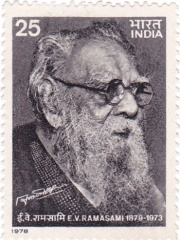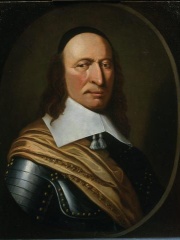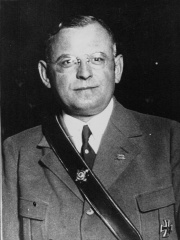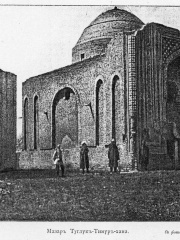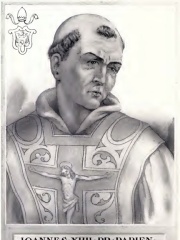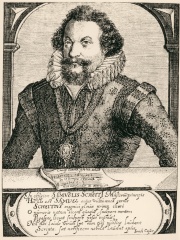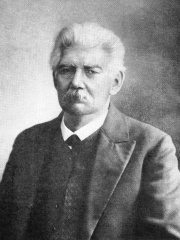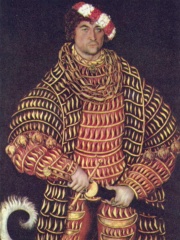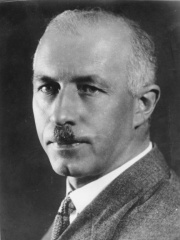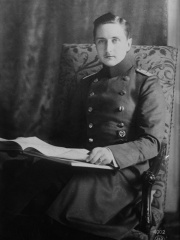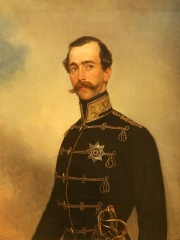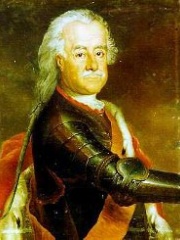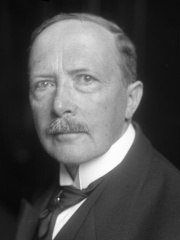Politician
Gerberga of Saxony
913 - 984
EN.WIKIPEDIA PAGE VIEWS (PV)

 Gerberga of Saxony
Gerberga of Saxony
Her biography is available in 29 different languages on Wikipedia. Gerberga of Saxony is the 5,269th most popular politician (down from 4,697th in 2024), the 1,383rd most popular biography from Germany (down from 1,273rd in 2019) and the 401st most popular German Politician.
Memorability Metrics
Page views of Gerberga of Saxony by language
Among Politicians
Among politicians, Gerberga of Saxony ranks 5,269 out of 19,576. Before her are Infanta Pilar, Duchess of Badajoz, Bermudo II of León, Periyar E. V. Ramasamy, Mohamed Abdelaziz, Étienne Mourrut, and Peter Stuyvesant. After her are Franz Seldte, Gaius Marius the Younger, Duke Xiao of Qin, Gilberto Rodríguez Orejuela, Tughlugh Timur, and Milo Đukanović.
Most Popular Politicians in Wikipedia
Go to all RankingsInfanta Pilar, Duchess of Badajoz
1936 - 2020
HPI: 66.22
Rank: 5,265
Bermudo II of León
953 - 999
HPI: 66.22
Rank: 5,266
Periyar E. V. Ramasamy
1879 - 1973
HPI: 66.22
Rank: 5,267
Mohamed Abdelaziz
1946 - 2016
HPI: 66.22
Rank: 5,268
Étienne Mourrut
1939 - 2014
HPI: 66.21
Rank: 5,269
Peter Stuyvesant
1612 - 1672
HPI: 66.21
Rank: 5,270
Gerberga of Saxony
913 - 984
HPI: 66.21
Rank: 5,271
Franz Seldte
1882 - 1947
HPI: 66.21
Rank: 5,272
Gaius Marius the Younger
109 BC - 82 BC
HPI: 66.21
Rank: 5,273
Duke Xiao of Qin
381 BC - 338 BC
HPI: 66.20
Rank: 5,274
Gilberto Rodríguez Orejuela
1939 - 2022
HPI: 66.20
Rank: 5,275
Tughlugh Timur
1329 - 1363
HPI: 66.20
Rank: 5,276
Milo Đukanović
1962 - Present
HPI: 66.20
Rank: 5,277
Contemporaries
Among people born in 913, Gerberga of Saxony ranks 1. After her are Al-Mansur Billah, and Abu al-Hassan al-Amiri. Among people deceased in 984, Gerberga of Saxony ranks 2. Before her is Pope John XIV. After her are Lubna of Córdoba, and Æthelwold of Winchester.
Others Born in 913
Go to all RankingsGerberga of Saxony
POLITICIAN
913 - 984
HPI: 66.21
Rank: 1
Al-Mansur Billah
POLITICIAN
913 - 953
HPI: 65.71
Rank: 2
Abu al-Hassan al-Amiri
PHILOSOPHER
913 - 992
HPI: 59.91
Rank: 3
Others Deceased in 984
Go to all RankingsPope John XIV
RELIGIOUS FIGURE
1000 - 984
HPI: 75.49
Rank: 1
Gerberga of Saxony
POLITICIAN
913 - 984
HPI: 66.21
Rank: 2
Lubna of Córdoba
PHILOSOPHER
922 - 984
HPI: 62.07
Rank: 3
Æthelwold of Winchester
RELIGIOUS FIGURE
900 - 984
HPI: 52.36
Rank: 4
In Germany
Among people born in Germany, Gerberga of Saxony ranks 1,383 out of NaN. Before her are Samuel Scheidt (1587), Vasily Radlov (1837), Erika Mann (1905), Wilhelm Stuckart (1902), Henry IV, Duke of Saxony (1473), and Herschel Grynszpan (1921). After her are Franz Seldte (1882), Bert Sakmann (1942), Hermann Graf (1912), Gottfried Feder (1883), Helmut Haller (1939), and Princess Antoinette of Brunswick-Wolfenbüttel (1696).
Others born in Germany
Go to all RankingsSamuel Scheidt
COMPOSER
1587 - 1654
HPI: 66.25
Rank: 1,377
Vasily Radlov
LINGUIST
1837 - 1918
HPI: 66.24
Rank: 1,378
Erika Mann
ACTOR
1905 - 1969
HPI: 66.24
Rank: 1,379
Wilhelm Stuckart
POLITICIAN
1902 - 1953
HPI: 66.24
Rank: 1,380
Henry IV, Duke of Saxony
POLITICIAN
1473 - 1541
HPI: 66.24
Rank: 1,381
Herschel Grynszpan
POLITICIAN
1921 - 1942
HPI: 66.24
Rank: 1,382
Gerberga of Saxony
POLITICIAN
913 - 984
HPI: 66.21
Rank: 1,383
Franz Seldte
POLITICIAN
1882 - 1947
HPI: 66.21
Rank: 1,384
Bert Sakmann
BIOLOGIST
1942 - Present
HPI: 66.19
Rank: 1,385
Hermann Graf
PILOT
1912 - 1988
HPI: 66.19
Rank: 1,386
Gottfried Feder
ECONOMIST
1883 - 1941
HPI: 66.18
Rank: 1,387
Helmut Haller
SOCCER PLAYER
1939 - 2012
HPI: 66.18
Rank: 1,388
Princess Antoinette of Brunswick-Wolfenbüttel
POLITICIAN
1696 - 1762
HPI: 66.18
Rank: 1,389
Among Politicians In Germany
Among politicians born in Germany, Gerberga of Saxony ranks 401. Before her are Frederick II, Elector of Brandenburg (1413), Prince August Wilhelm of Prussia (1887), Maximilian de Beauharnais, 3rd Duke of Leuchtenberg (1817), Wilhelm Stuckart (1902), Henry IV, Duke of Saxony (1473), and Herschel Grynszpan (1921). After her are Franz Seldte (1882), Princess Antoinette of Brunswick-Wolfenbüttel (1696), Alfried Krupp von Bohlen und Halbach (1907), Leopold I, Prince of Anhalt-Dessau (1676), Duchess Charlotte Felicitas of Brunswick-Lüneburg (1671), and Walter Simons (1861).
Frederick II, Elector of Brandenburg
1413 - 1471
HPI: 66.27
Rank: 395
Prince August Wilhelm of Prussia
1887 - 1949
HPI: 66.27
Rank: 396
Maximilian de Beauharnais, 3rd Duke of Leuchtenberg
1817 - 1852
HPI: 66.25
Rank: 397
Wilhelm Stuckart
1902 - 1953
HPI: 66.24
Rank: 398
Henry IV, Duke of Saxony
1473 - 1541
HPI: 66.24
Rank: 399
Herschel Grynszpan
1921 - 1942
HPI: 66.24
Rank: 400
Gerberga of Saxony
913 - 984
HPI: 66.21
Rank: 401
Franz Seldte
1882 - 1947
HPI: 66.21
Rank: 402
Princess Antoinette of Brunswick-Wolfenbüttel
1696 - 1762
HPI: 66.18
Rank: 403
Alfried Krupp von Bohlen und Halbach
1907 - 1967
HPI: 66.16
Rank: 404
Leopold I, Prince of Anhalt-Dessau
1676 - 1747
HPI: 66.15
Rank: 405
Duchess Charlotte Felicitas of Brunswick-Lüneburg
1671 - 1710
HPI: 66.15
Rank: 406
Walter Simons
1861 - 1937
HPI: 66.14
Rank: 407


